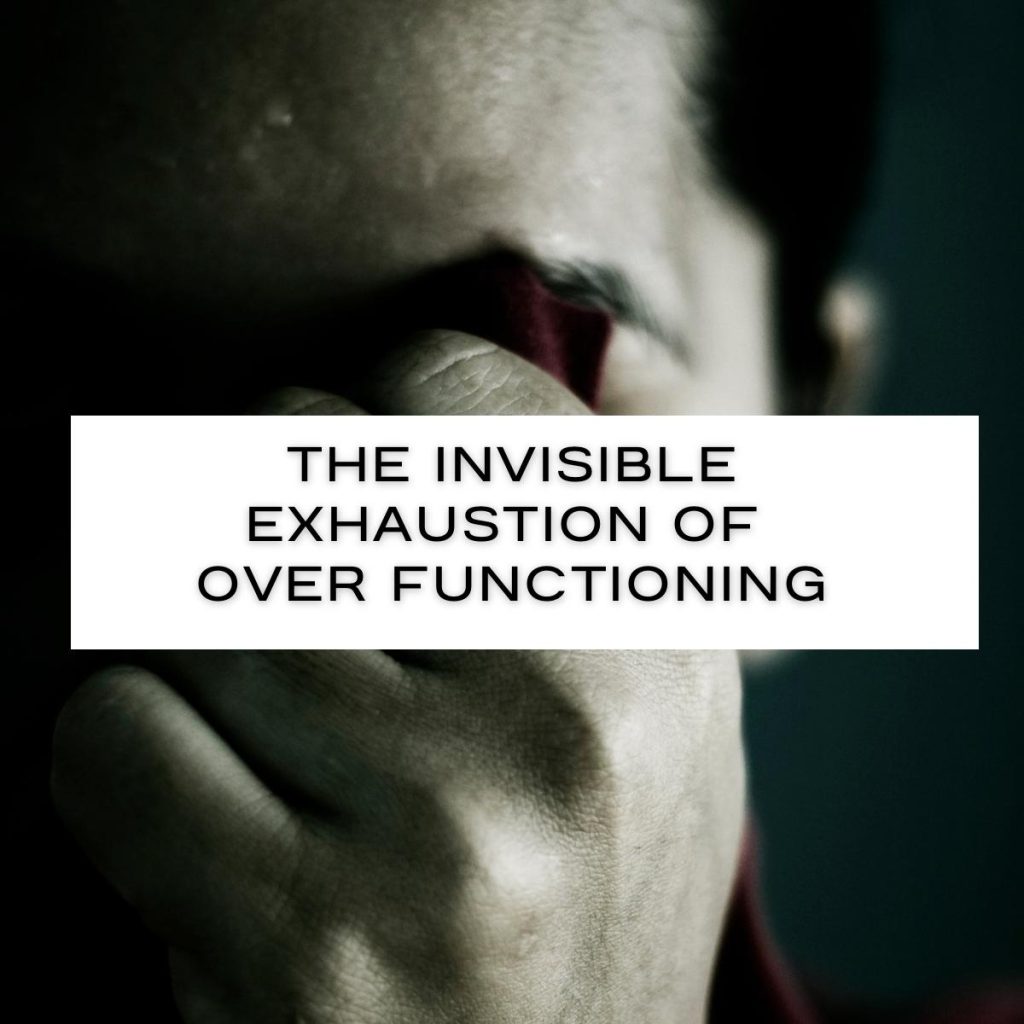You show up. You hold it together. You solve the problem. Again. And again.
But what if the very thing that makes you competent is also quietly draining you?
In the legal world, being dependable is currency. The one who overdelivers is trusted. The one who stays late is valued. The one who never drops the ball is praised. But this consistent over functioning, performing at a level that masks any struggle has a cost.
Not all burnout comes from chaos. Sometimes, it comes from composure.
What Is Over functioning?
Over functioning is a pattern where individuals take on more responsibility than is sustainable, mentally, emotionally, or physically, often without recognising it. It’s not the same as overworking. It’s more subtle. More psychological.
It’s the internal belief that:
• “If I don’t do it, it won’t get done right.”
• “I’m the one they rely on.”
• “I can’t afford to drop this ball.”
In legal practice, this mindset is often rewarded. But beneath it is a nervous system running hot, a brain overstimulated by responsibility, and an identity tied so tightly to performance that rest feels unsafe.
Why Lawyers Are Prone to Over functioning?
1. The Reward Loop
The legal system celebrates capability. The more you handle, the more you’re handed. The more you deliver, the more you’re expected to. This builds a loop where your competence becomes the reason you’re overloaded.
2. Identity Fusion
Lawyers often merge their sense of self with their professional function. You’re not just doing the job – you are the job. This makes it hard to step back without feeling like you’re failing or losing control.
3. Perceived Control
Over functioning gives the illusion of control in an inherently uncertain environment. You handle more because you believe it reduces risk. But instead, it increases the internal load and isolates you from support.
4. Unseen Pressure
Unlike adrenaline-fuelled chaos, over functioning is quiet. You’re not running late or dropping deadlines. You’re managing it all, until you’re not. The collapse often comes as a surprise, even to you.
The Neuropsychology Behind Over functioning
From a brain-based perspective, over functioning activates the prefrontal cortex, the area responsible for planning, decision-making, and impulse control. In the short term, this produces sharp thinking and high output. But sustained activation without recovery depletes the brain’s glucose, oxygen, and dopamine reserves, leading to cognitive fatigue.
Worse, this often occurs without visible performance decline. You still deliver but with more internal cost.
Symptoms include:
• Emotional flatness
• Difficulty focusing
• Irritability in personal life
• Low-grade anxiety masked by busyness
• Loss of enjoyment, even in achievement
This is why so many high-performing lawyers burn out not with a bang, but with a quiet disconnection from their own lives.
The Hidden Signs You’re Over functioning
You might be over functioning if:
• You are exhausted but feel guilty resting.
• You handle everything because it’s “easier” than asking for help.
• You keep performing, even when you’re internally unravelling.
• You feel resentful that no one notices how much you are carrying but you don’t say anything.
• You are known as “the strong one.”
This is not resilience. Its depletion disguised as strength.
The Cost of Being the One Who Holds It All
In legal practice, the over functioning lawyer becomes both admired and exploited by the system, by clients, and often by themselves.
The cost is not just emotional. It’s strategic.
• You lose clarity. Overloaded minds can’t prioritise.
• You lose creativity. There’s no bandwidth for strategic insight.
• You lose connection. Relationships become functional, not meaningful.
• You lose sustainability. The longer you perform beyond capacity, the shorter your runway.
And perhaps most painfully: you start to feel invisible. Because people don’t check on the ones who never complain.
How to Step Out of the Pattern Without Dropping the Ball
The solution is not doing less. It is about doing differently. The goal is to retain your high standards without quietly breaking yourself in the process.
1. Reset Your Internal Scorecard
Shift from “Did I do enough?” to “Did I protect my capacity to keep showing up tomorrow?”
2. Name the Pattern
Awareness breaks the loop. Recognise when you’re saying yes out of fear, not strategy. You are not lazy for setting limits, but you are professional for planning longevity.
3. Redistribute Mental Load
Not everything must live in your head. Use systems, checklists, delegation, not to offload responsibility, but to preserve cognitive clarity.
4. Reinforce Recovery
Cognitive function is not an infinite resource. Prioritise low-stimulation time (solitude, nature, non-legal reading) to restore the brain’s processing power.
5. Create Micro-Moments of Support
Even if you are the leader or the anchor in your team, build micro-habits that allow you to receive, whether that’s debriefing with a colleague, 10-minute resets between tasks, or explicitly asking: “Can this wait?”
Final Thought
Over functioning is not a character flaw. It is a survival strategy that is unsustainable.
The legal profession attracts the capable. But if you are not careful, it will convince you that your value lies in how much you carry, not how clearly you think.
You are allowed to be strategic with your energy.
You are allowed to rest before you collapse.
You are allowed to be excellent and human.
If you’re ready to move beyond survival mode and protect your most valuable asset – your mind – explore cognitive performance training with PMRI.
Visit www.pmri.co.za or contact us at info@pmri.co.za for workshops, coaching, and resilience-based strategy tailored for legal professionals.


